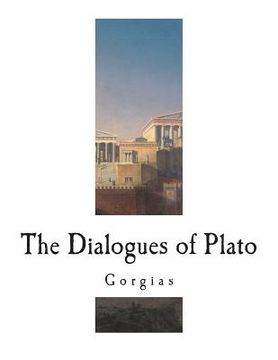Share
Gorgias: The Dialogues of Plato (in English)
Platón
(Author)
·
Createspace Independent Publishing Platform
· Paperback
Gorgias: The Dialogues of Plato (in English) - Jowett, Benjamin ; Plato
$ 6.27
$ 7.95
You save: $ 1.68
Choose the list to add your product or create one New List
✓ Product added successfully to the Wishlist.
Go to My WishlistsIt will be shipped from our warehouse between
Thursday, May 30 and
Friday, May 31.
You will receive it anywhere in United States between 1 and 3 business days after shipment.
Synopsis "Gorgias: The Dialogues of Plato (in English)"
Gorgias by Plato. Translated by Benjamin Jowett. Gorgias; c. 485 - c. 380 BC, was a Greek sophist, Siceliote, pre-Socratic philosopher and rhetorician who was a native of Leontini in Sicily. Along with Protagoras, he forms the first generation of Sophists. Several doxographers report that he was a pupil of Empedocles, although he would only have been a few years younger. "Like other Sophists, he was an itinerant that practiced in various cities and giving public exhibitions of his skill at the great pan-Hellenic centers of Olympia and Delphi, and charged fees for his instruction and performances. A special feature of his displays was to ask miscellaneous questions from the audience and give impromptu replies." He has been called "Gorgias the Nihilist" although the degree to which this epithet adequately describes his philosophy is controversial. In several of the dialogues of Plato, doubts have arisen among his interpreters as to which of the various subjects discussed in them is the main thesis. The speakers have the freedom of conversation; no severe rules of art restrict them, and sometimes we are inclined to think, with one of the dramatis personae in the Theaetetus, that the digressions have the greater interest. Yet in the most irregular of the dialogues there is also a certain natural growth or unity; the beginning is not forgotten at the end, and numerous allusions and references are interspersed, which form the loose connecting links of the whole. We must not neglect this unity, but neither must we attempt to confine the Platonic dialogue on the Procrustean bed of a single idea. (Compare Introduction to the Phaedrus.)
- 0% (0)
- 0% (0)
- 0% (0)
- 0% (0)
- 0% (0)
All books in our catalog are Original.
The book is written in English.
The binding of this edition is Paperback.
✓ Producto agregado correctamente al carro, Ir a Pagar.

